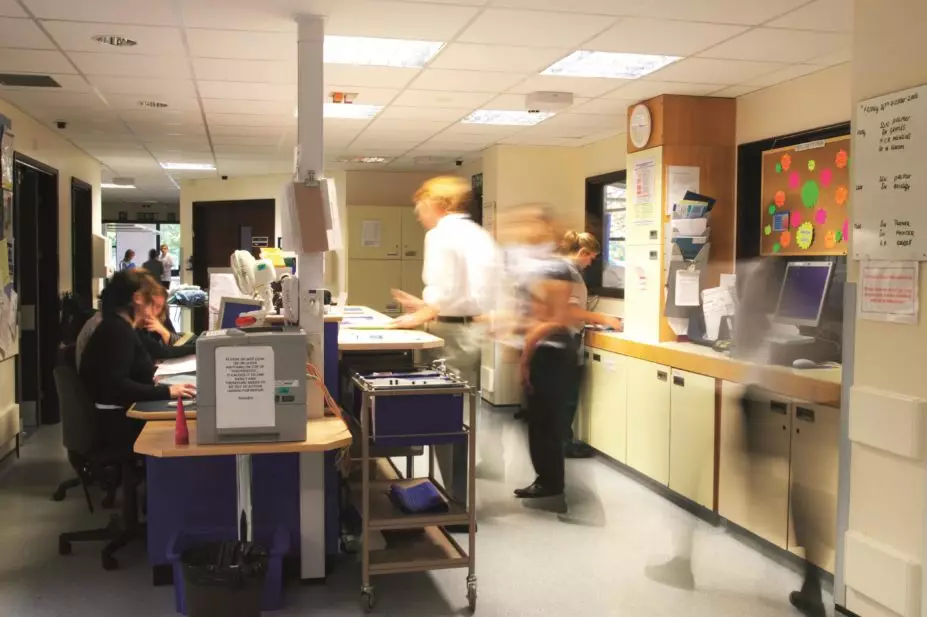
Julian Claxton / Alamy
Newly qualified pharmacists are being drafted into inpatient wards at a hospital in the east of England, after it struggled to recruit enough nurses.
Chiefs at Colchester University Hospital NHS Foundation Trust recently gave the green light to employ foundation-level pharmacists in band 6 positions across four pilot wards covering medical, surgical, orthopaedic and elderly care.
Under the project, believed to be the first of its kind in England, newly qualified pharmacists will undertake medicines management tasks, such as supply and optimisation, alongside typical nursing responsibilities including IV cannulation, drug rounds and discharge planning, among other duties.
Chief pharmacist Richard Needle, who helped instigate the project, says the roles are a huge opportunity for junior pharmacists. “As far as we’re aware no one’s done anything like this before. If it works, there is the potential in the years to come for wards staffed by just nursing staff to become wards staffed by multidisciplinary teams.
“It’s an exciting prospect. Anyone who goes through this experience and puts it on their CV will be well set up. It’ll be a springboard for the rest of their career.”
The foundation trust has faced an “all-time high” of nursing vacancy rates on inpatient wards in recent months, a problem experienced across the NHS. Recruitment efforts continue but it remains “an ongoing challenge to maintain safe patient-staff ratios”, according to a briefing paper for the project.
In contrast, it received a large number of applications for a band 6 pharmacist post, and it is now seeking “to capitalise on the abundance of newly qualified pharmacists” to address the clinical staffing shortfall on wards.
Professional mentoring
Under the initiative, approved by trust executives on 1 May 2015, funding for unfilled nursing roles will be used to hire up to 12 pharmacists under two-year, fixed term internships. Each pharmacist is likely to work 12-hour days on seven-day shift patterns on one of four wards.
The pharmacists will undertake a competency programme and be mentored professionally by a senior nurse and a senior pharmacist, working with the University of East Anglia, which will help run the clinical diploma aspect of the project. The pharmacists will be managed by the ward sister. The new roles will not replace the responsibilities of the pharmacists who already work on the wards.
The trust hopes the benefits will include a reduction in temporary staff, better medicines reconciliation and reduced medication errors and omitted doses. It also targets reduced medicines waste and drug costs, improved antibiotic stewardship and reductions in delays to discharge.
The project was initiated after it received 20 applicants for the role of band 6 pharmacist. Needle discussed with senior managers how the trust could make use of this available workforce. “The more we thought about it, the more we could see the value of having pharmacists in the roles,” he says.
Needle says applicants for the foundation roles will use their core clinical pharmacy skills and be upskilled to provide some of the caring duties otherwise offered by nurses.
‘Very positive’
Catherine Duggan, director of professional development and support at the Royal Pharmaceutical Society, says: “This is an innovative project which seeks to use funding originally set for nursing roles to employ pharmacists who can undertake diagnostics and deliver care, with specific additional training, alongside optimising medicines use and supply.
“It’s an example of where pharmacy is adapting the role and extending the services, much like the advanced clinical role in accident and emergency (A&E) departments across England. As long as the pharmacists employed are supported in their foundation practice, through foundation training, and are appropriately equipped to deliver the additional diagnostics, I think this is very positive.”
Masters students will evaluate the impact and safety of the initiative, supported by the hospital and the University of East Anglia. Patients and staff will also be asked for their views.
The trust aims to recruit staff from May 2015, to begin working on the wards by September 2015.
It follows a national pilot of pharmacists in A&E departments, which began in April 2015.

